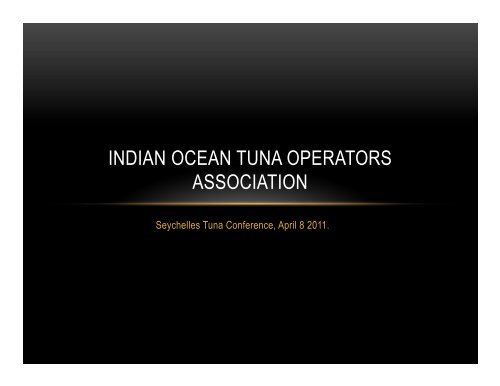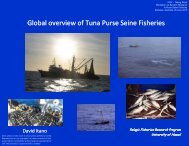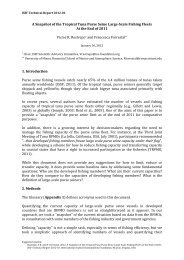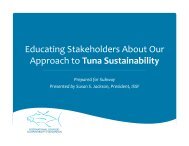Indian Ocean Tuna Operators Association.pptx
Indian Ocean Tuna Operators Association.pptx
Indian Ocean Tuna Operators Association.pptx
You also want an ePaper? Increase the reach of your titles
YUMPU automatically turns print PDFs into web optimized ePapers that Google loves.
INDIAN OCEAN TUNA OPERATORS<br />
ASSOCIATION<br />
Seychelles <strong>Tuna</strong> Conference, April 8 2011.
THE TUNA INDUSTRY IN THE<br />
SWIO ISLANDS<br />
• Three of the SW <strong>Indian</strong> <strong>Ocean</strong> Islands, namely<br />
Seychelles, Mauritius and Madagascar have a<br />
tuna industry<br />
• Between the 3 islands, the number of people<br />
employed directly by the manufacturers represents<br />
approximately 10 500 individuals, while more than<br />
1000 fishermen are employed on the vessels; the<br />
number of indirect jobs is estimated to be above<br />
17 000<br />
• In the factories, a large percentage of the people<br />
employed are specialised workers within the<br />
different organisation levels<br />
• 80% of the total employees are women
THE TUNA INDUSTRY IN THE<br />
SWIO ISLANDS<br />
• For the tuna companies to benefit of a duty free<br />
access to the European market – their main<br />
target – they must use “originating fish”<br />
• The unique source of this “originating fish” in this<br />
area, is the European and Seychelles fleet. They<br />
are the only ones able to supply not only the<br />
necessary volumes for the factories, but also the<br />
adequate quality
IMPACT OF TUNA INDUSTRY IN THE<br />
SWIO ISLANDS<br />
Madagascar Mauritius Seychelles<br />
No. of Companies 1 7 3<br />
Production capacity/<br />
year<br />
No. of direct labour<br />
(tuna plants)<br />
No of direct labour<br />
(fishermen)<br />
40 000t 110 000t 94 000t<br />
1500 6000 2500 10500<br />
1000<br />
No. of indirect labour 3000 12 000 2200 17 200<br />
Global sales € 50m € 187.5m € 130.9m<br />
GDP NA 1% 5%<br />
<strong>Tuna</strong> species YF, SKJ YF, SKJ, ALB YF, SKJ, ALB
THE TUNA INDUSTRY IN THE<br />
SWIO ISLANDS<br />
• A lot of effort – and investment – has been put<br />
throughout the whole chain of custody, starting<br />
with the fishing vessels, the reefers, the cold<br />
storage, the canneries… to fully comply with<br />
FDA regulations, and the European ones, in<br />
terms of SPS and IUU regulations
THE CHALLENGES FOR THE TUNA INDUSTRY<br />
• Our industry is under pressure due to external factors which represent<br />
immediate challenges:<br />
• FTAs and EPAs signed with countries of other regions, like the Pacific,<br />
have a direct impact on the SWIO tuna industry and threatening its core<br />
existence in the short and medium term<br />
• Somalian piracy has led to the fall in the number of EU ships by 30%.<br />
• It has a direct impact on the <strong>Indian</strong> <strong>Ocean</strong> tuna industry:<br />
• A decrease in the supply of “originating fish”<br />
• High costs of additional security measures (€ 500k per boat per year) for<br />
the fishing vessels and reefers put at risk the fleets thus adding pressure<br />
on the industry as a whole. Furthermore, due to the security rules of<br />
engagement, productivity on the ships has come down by 15 to 20%
INDIAN OCEAN TUNA CATCHES<br />
ALL FLEETS<br />
In thousands of tons<br />
1400<br />
1200<br />
1000<br />
800<br />
600<br />
400<br />
200<br />
Albacore<br />
Big Eye<br />
Yellowfin<br />
Skipjack<br />
0<br />
2005 2006 2007 2008<br />
The decrease in catches is mainly due to the impact of piracy and the<br />
consequent reduction in European catches
THE CHALLENGES FOR THE<br />
TUNA INDUSTRY<br />
• Our industry is under pressure due to external<br />
factors which represent immediate challenges<br />
(contd.):<br />
• Sustainability of the resource. Retailers, in<br />
response to an increasing pressure from the<br />
consumers, ask more and more for sustainable<br />
fish. On certain markets it has even become<br />
mandatory…<br />
• The increasing pressure from NGOs against the<br />
use of FADs and their concerns about the nature<br />
and levels of by-catch
THE RESPONSE OF THE SWIO INDUSTRY
THE FACTUAL RESPONSE OF<br />
THE SWIO TUNA INDUSTRY<br />
• Faced to the sustainability challenge, the<br />
whole of the regional tuna industry (from<br />
fishing vessels to canneries) has decided<br />
to regroup to work together and improve/<br />
change their ways of working to minimise,<br />
as much as possible, their impact on the<br />
environment
THE FACTUAL RESPONSE OF<br />
THE SWIO TUNA INDUSTRY<br />
• The <strong>Indian</strong> <strong>Ocean</strong> <strong>Tuna</strong> <strong>Operators</strong><br />
<strong>Association</strong> has thus been created and will<br />
work in close partnership with the <strong>Indian</strong><br />
<strong>Ocean</strong> Commission within their “Fishing<br />
Program”, and of course, the <strong>Indian</strong> <strong>Ocean</strong><br />
<strong>Tuna</strong> Commission… and will involve all<br />
other stakeholders of the region<br />
• This Project will follow the FAO guidelines<br />
but will go beyond the “resource” and<br />
“environment” criteria…
CRITERIA CHOSEN BY IOTOA
INDIAN OCEAN TUNA OPERATORS ASSOCIATION
IOTOA<br />
• IOTOA is a non-profit making organisation<br />
• Our <strong>Association</strong> represents the whole tuna industry in the South<br />
West <strong>Indian</strong> <strong>Ocean</strong>, comprising of European and Seychelles<br />
purse seiners and tuna manufacturers from the <strong>Indian</strong> <strong>Ocean</strong><br />
Islands as defined by the <strong>Indian</strong> <strong>Ocean</strong> Commission<br />
(Seychelles, Madagascar, Mauritius, Reunion and Comoros).
OUR OBJECTIVES<br />
• Create a platform of discussion for the different IO tuna stakeholders<br />
• Work together, as purse seiners and producers, to improve/change<br />
our ways of working to minimise as much as possible our impact on<br />
the environment<br />
• Adopt the best possible practices to comply with the protection of the<br />
environment, both natural and social<br />
• Comply with IUU Legislation and promote the fight against any IUU<br />
fishing<br />
• Adopt the best possible transparent practices in terms of traceability
OUR OBJECTIVES<br />
• Ensure food safety<br />
• Fully support the RFMOs and IOTC in<br />
particular; encourage transparency and full<br />
cooperation<br />
• Contribute to the “Millennium Development<br />
Goals” in terms of poverty alleviation,<br />
respect of the environment, promotion of<br />
women’s empowerment and gender<br />
equality, and contribution to primary<br />
education for children.
THE WAY FORWARD…
THE WAY FORWARD<br />
• A pre-audit will be done throughout the whole<br />
Chain of Custody of the 3 different countries<br />
involved, within the coming 2 months, at the<br />
initiative of the IOC and with the expertise of the<br />
FAO<br />
• Some fleet-owners, on their side, have also<br />
already initiated a number of programs (as<br />
presented earlier)
Our expectations, within the next three years, are:<br />
together with all the stakeholders involved in the tuna<br />
industry, to develop and implement new, realistic<br />
measures, to support the marine environment and<br />
contribute to the social and economic development of<br />
the <strong>Indian</strong> <strong>Ocean</strong> region,<br />
for the coming generations…
THANK YOU







